Sahiyo staff spotlight: Programs assistant Meg Sinnott

Meg recently finished her Bachelor’s degree in Sociology and Social Policy at Trinity College Dublin, in Ireland. As a first-generation immigrant born in Switzerland, she has developed a love for learning about different cultures which has led her to become an advocate for the empowerment of minority groups. During her time at college, Meg was an avid member of the Gender Equality Society and coordinated events for the entire university over the course of International Women’s Week, including a panel discussion about FGC with the Afro-Caribbean Society. She recently moved to Colorado with her dog Ruby and looks forward to supporting and expanding Sahiyo’s various programs. What was your experience of learning about female genital cutting (FGC) for the first time? Interestingly, I must have learned about FGC so long ago that I do not have a specific memory tied to hearing about it for the first time. I think this may be for two reasons. Firstly, in my experience growing up as a woman, gender-based violence was not something that my mother sat down and told me about; instead, it trickled into my subconscious through microaggressions, news stories, and personal experiences. Secondly, as a White Atheist living in Europe, I struggled to understand religiously-rooted gender-based violence. My reaction to learning about FGC was similar to when I learned about women wearing the Burqa from a Western liberal perspective: I saw it only as a way to control women. Due to the inherent racism in framing this issue in such a manner, I was only aware of the existence of Type III FGC and thought that FGC only happened in African countries. Unfortunately, as a result of this belief, I only became aware of the extent and impact of FGC over the last few years, when I learned more about the practice at university. The first time I can remember learning about FGC in a way that opened my eyes to the violence and scale of the practice was at an event in which women who were cut or were indirectly impacted by FGC spoke about their experiences. This was eye-opening for me because I have always had the privilege of thinking about the impact of FGC in terms of statistics, rather than something that happens to women in real life. Hearing the speakers’ personal stories shocked me into understanding the reality of FGC. It is not to say that I had no feelings of sisterhood with women affected by FGC, but through storytelling, I could picture myself as a member of a community practicing FGC in a way that I could not previously. Before, I was afraid to offend those in communities that practice FGC by imposing my White and Atheist viewpoints on them. Listening to women in those same communities condemn the practice showed me that this issue was not one of culture but gender-based violence, control, and child abuse. This realization is what began my path to advocating against FGC. When and how did you first get involved with Sahiyo? I first got involved with Sahiyo in March of this year as a staff member. I had just moved back to the United States after graduating from Trinity College in Dublin when I learned about Sahiyo and the valuable work of the team and community against FGC. Throughout my degree in Sociology and Social Policy, I studied women’s issues and knew that I wanted to work to end gender-based violence in any way I could. Since childhood, I have been a writer and storyteller, so Sahiyo’s use of storytelling as activism was compelling. Watching the first few videos on Sahiyo’s YouTube channel of survivors sharing stories crafted through the Voices to End FGM/C Digital Storytelling program had a profound impact on me. Personally, I knew when I graduated that I was looking to join a team that cared about each other and their work. I have definitely found this to be the case working with my team members at Sahiyo! What does your work with Sahiyo involve? I am the Programs Assistant at Sahiyo, so my role is to provide administrative, development, and organizational support to the Programs Team on Sahiyo’s numerous programs and projects. Something that I am currently working on that excites me is our latest research project, Critical Intersections, which is in its beginning stages. In my eyes, social research is another form of storytelling. Developing a methodology and survey instrument to acquire data that can help mobilize activists and changemakers is important work that I am proud to be a part of. How has your involvement with Sahiyo impacted your life? My involvement with Sahiyo has broadened my perspective on FGC and has also made me a better activist. It is inspiring to work alongside a global network of female activists. Aside from my life being positively impacted by having amazing co-workers, I think of issues from a more intersectional perspective. I was shocked when I found several connections to FGC in my personal life and as a result, I have been making an effort to consider the intersections of identities and the human rights issues that I advocate for. What words of wisdom would you like to share with others who may be interested in supporting Sahiyo and the movement against FGC? I would like to share with others that anyone can support Sahiyo and the movement against FGC. You do not need to be a member of the FGC practicing community or a survivor to get involved and make a positive impact; simply having a conversation about FGC with people in your life spreads awareness about the issue and helps to create change. Sahiyo has many fantastic resources to help guide conversations around FGC. In my experience, the more I learned about Sahiyo’s mission and values the more I became interested and involved with all of the programs.
Sahiyo staff spotlight: Development assistant Michelle Taylor
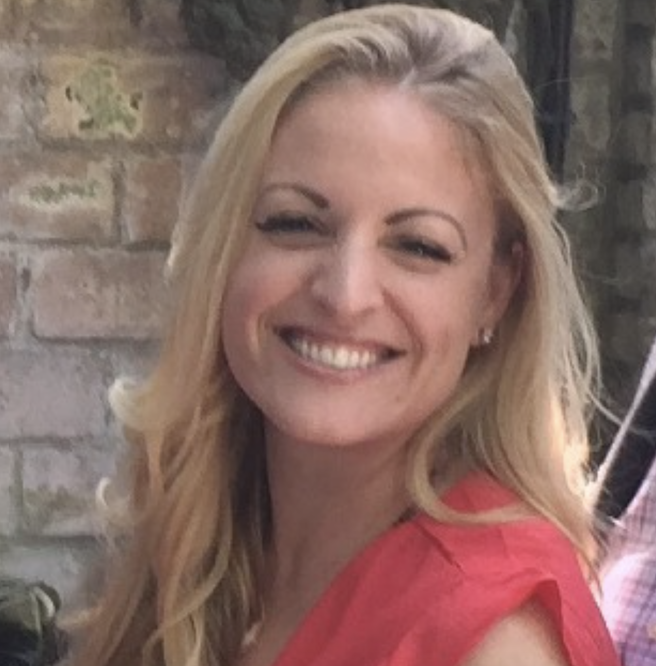
Michelle comes to Sahiyo with over a decade of nonprofit development and fundraising experience focusing on various areas including youth development, health, education, and women’s empowerment. Michelle earned a Bachelor of Science in Business Administration from California State University, Long Beach, majoring in finance and international business. She developed a strong sense of commitment to bettering the world by focusing on individual communities as a Small Enterprise Development Peace Corps Volunteer in Sénégal, West Africa. Expanding on this desire to help others, she then earned a Master of Science in International Affairs from Marquette University in Milwaukee, Wisconsin. Michelle is excited to bring her vast knowledge of finance, marketing, managing successful nonprofit events, drive to help others, and passion for her greater community to help advance Sahiyo’s mission to end female genital cutting and create positive social change through dialogue, education, and collaboration. What was your experience of learning about female genital cutting (FGC) for the first time like? I first learned about FGC while serving in the Peace Corps in West Africa. I was initially shocked to learn that FGC is practiced around the world today and that even young girls in my host village, some younger than one year old, had experienced this. I believe that ending the practice of FGC is not only a matter of human rights, health and safety, but a matter of gender equality. The more we are able to educate the masses about this practice and its negative effects on children and women, we will be one step closer to seeing the end of FGC. When and how did you get involved with Sahiyo? I started working with Sahiyo in February after finding the job posting on Indeed. I was so excited to have found this incredible organization and was especially thrilled to join a group led by strong, inspiring women working toward the goal to end FGC! What does your work with Sahiyo include? As Development Assistant, I provide administrative and development support on various programs and projects, including current and potential grant opportunities and funds. I’m also excited to be organizing a silent auction fundraiser, which will be the first that this organization has done. I currently manage one amazing Development Intern and hope to bring on a few more to our Development Team over the coming months. How has your involvement with Sahiyo impacted your life? Working for such an important cause makes me excited to see the change and impact every day! I’ve loved working in the nonprofit development arena over the past number of years – helping worthy organizations raise the funds they need to make the world a better place is incredibly rewarding. I’m excited to spread awareness of Sahiyo and work toward ending FGC globally. What words of wisdom would you like to share with others who may be interested in supporting Sahiyo and the movement against FGC? I would recommend that everyone take the initiative to learn as much as you can about this human rights violation and its effects on women and children. Then spread awareness by sharing the information you learn with friends and family. You can support Sahiyo by volunteering, donating to our cause, and we’re always looking for enthusiastic and driven interns!
Sahiyo participates in Massachusetts Healthy Youth Consortium

On November 1st Sahiyo partnered with The Massachusetts Healthy Youth Consortium (MAHYC) to hold a training for K-12 teachers about the importance of using education as a means of preventing female genital cutting (FGC) and how they can become advocates against this practice. The goal of MAHYC is for educators, health professionals, policymakers, and other advocates to work collaboratively towards helping to pass The Healthy Youth Act which would ensure that comprehensive curricula are taught in public schools that choose to offer sex education. Massachusetts ranks 12th in the nation for at-risk populations, with nearly 15,000 girls at risk, with the largest at-risk areas being Boston, Newton, and Cambridge. FGC is often rooted in secrecy and isolation, and girls at risk are often taught never to speak of what they experienced. Sahiyo believes that education can be a powerful tool to break this silence and bring some clarity to the myths surrounding female genital cutting. Watch the training here.
Sahiyo staff spotlight: Editorial coordinator Rachel Wine
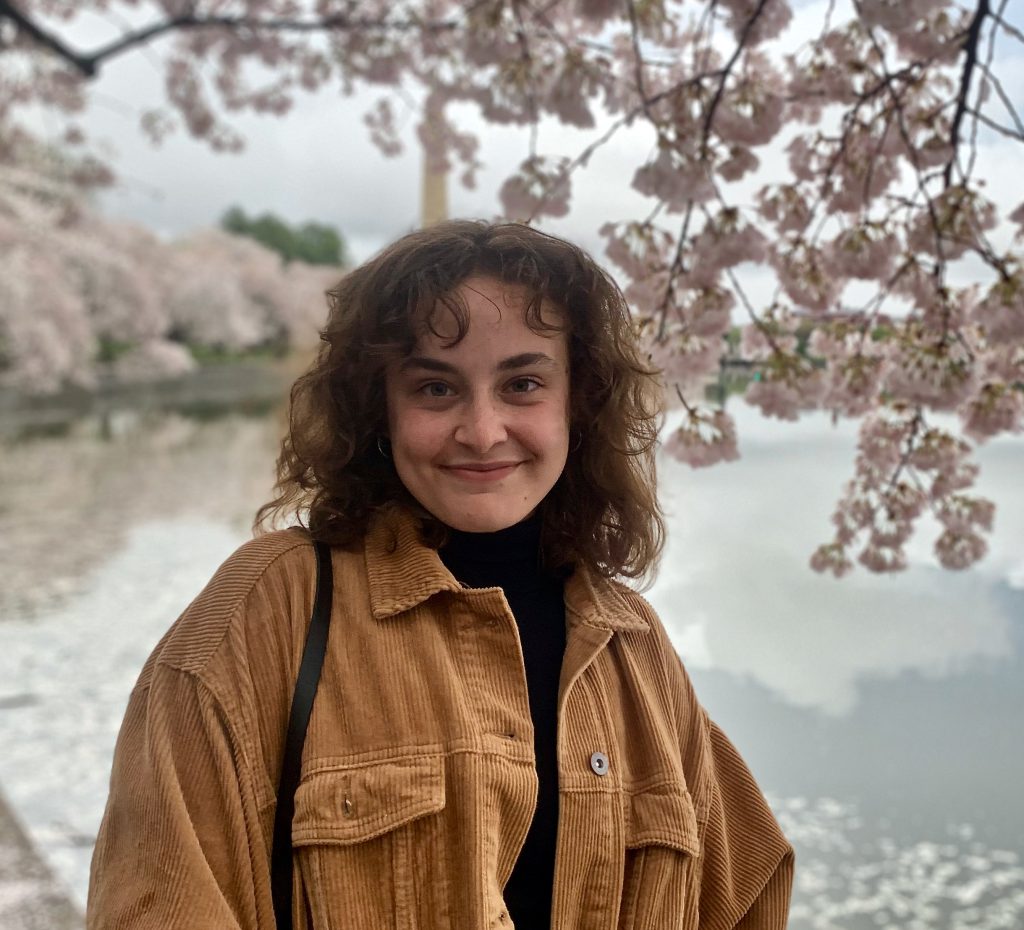
Rachel is a graduate student at Georgetown University, working towards her Master’s of Science in Global Health with a focus on health equity. In 2020, she earned her BSPH at Tulane University, where she double-majored in public health and anthropology with a minor in international development. Her passion lies at the intersection of activism and storytelling, and she loves supporting Sahiyo’s work of elevating survivors’ voices for the empowerment of women everywhere. When and how did you first get involved with Sahiyo? I first started working with Sahiyo in September of 2021. I had learned about the incredible work Sahiyo was doing from another graduate of my Master’s program, who had also worked with Sahiyo, and found myself extremely drawn to Sahiyo’s work and mission. What does your work with Sahiyo involve? As editorial coordinator, a big part of my work is supporting survivors and allies in developing their stories into blog posts. I love being a part of a process that amplifies these voices, and watching the exploration of their thoughts, feelings, and opinions on their experience. I also work to create the monthly newsletter, which updates our many subscribers on Sahiyo’s activities over the past month! How has your involvement with Sahiyo impacted your life? Coming from a public health background, I saw FGC handled as a “cultural practice” that Westerners didn’t have the lens to understand. In fact, during one of my maternal and child health classes, a professor told us that we couldn’t judge the practice because it was based on cultural norms and values different from ours. I didn’t really question this, until I interviewed at Sahiyo. Since beginning my work here, exposure to survivors’ stories and the expertise of Sahiyo’s co-founders has helped me realize that, although FGC may be based in cultural or religious norms, this doesn’t erase its undeniable roots in gender violence. And while FGC is also a pervasive issue in the West, there are many cultural norms that originate in Western societies, like the over-sexualization of the female body in the media, that are harmful to young women and girls; however, I don’t think anyone would negate the harm caused by this just because it’s tied to “cultural norms.” This realization really forced me to take a step back and re-examine the way I view the world in many ways. What words of wisdom would you like to share with others who may be interested in supporting Sahiyo and the movement against FGC? Every act of violence against women is interconnected. Though I come from a community that does not practice FGC, it is still my job to call out this form of gender violence that affects women around the world; ending violence that is ingrained in cultural or religious norms, especially in cultures and religions that are not mine, is my fight. Intersectional feminism is the only way to achieve liberation of all women.
Sahiyo partners with FAWCO to lead an educational webinar on Female Genital Mutilation/Cutting in the United States
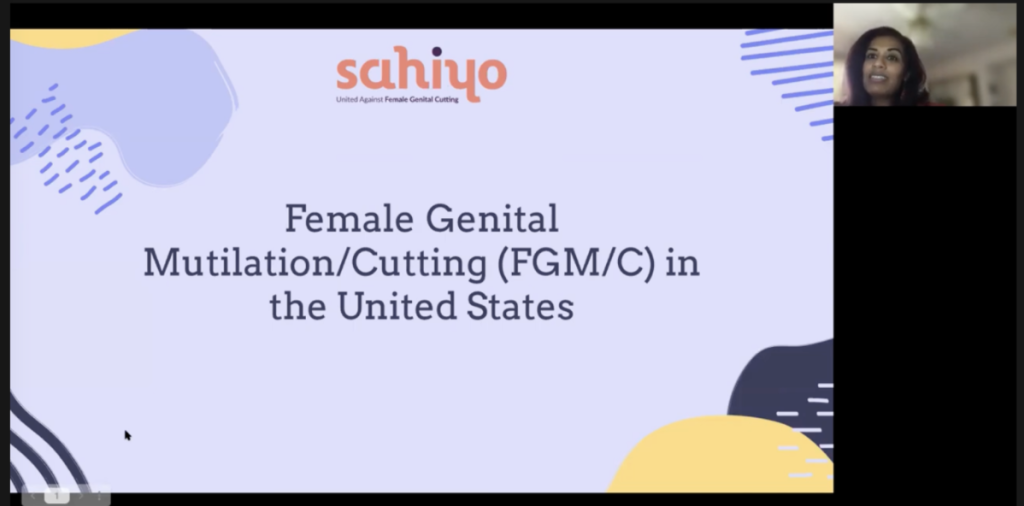
By Beth Fotheringham On the 16th of September, the FAWCO Target Team collaborated with Sahiyo for an educational webinar about FGM/C in the United States. The webinar sought to highlight the essential work Sahiyo does in their work to end FGC and support survivors. At the start of the webinar, Sahiyo co-founder and U.S. Executive Director Mariya Taher provided context with her own expertise on both ‘khatna’ and the Dawoodi Bohras, a community that partakes in the harmful practice of FGM/C. Through her own journey of speaking out as a survivor, she recognised the need for an organised forum within practicing communities, as well as the individual and collective benefits of creating positive social change through empowerment. It was evident that this had informed Sahiyo’s own unique approach to supporting survivors and raising awareness, which centres on storytelling. Mariya proceeded to clarify the various terminologies used in talking about female genital cutting (FGC), as well as the different types of the practice; she deftly outlined why Sahiyo uses ‘cutting’ instead of ‘mutilation,’ while respecting the right of survivors to choose how to define and describe their own experiences. She unflinchingly laid out the fact that 500,000+ women and girls are estimated to be living with, or at risk of, FGM/C in the US. This was especially shocking for me to learn, due to so much of the discourse surrounding FGC focusing on cases in Africa or “developing” countries, and evidence of such practices being greatly underreported in the Western world. This figure was made even more impactful when Mariya further deconstructed the statistic. She posited that this is most likely an under-representation, as it does not include any diasporic communities from countries not included within the 32 countries studied by UNICEF. For example, the Bohra community, who do practice FGC, are not counted in this statistic, nor are most other Asian countries where evidence of FGC exists. The most recent study into FGC prevalence found evidence of FGC in 92 countries worldwide, strongly suggesting that the statistic from the United States is a considerable underestimate. Through the webinar, we learned that there are current efforts within the US by the Center for Disease Control and Prevent (CDC) to capture more accurate data, which sounded promising, but that data collection is in its early stages. In another part of the webinar, various survivor stories from the Voices to End FGC project were introduced. Renee Bergstrom’s story was particularly powerful in addressing and disrupting common misconceptions about where FGC takes place and to whom. Jenny’s story portrayed the devastating silence that upholds the practice happening generation after generation; Maryah Haidery’s story explored the various psychological consequences of FGC. All were both informative and inspiring. Mariya also spoke on the legal context of FGC in the United States, explaining and analysing the current federal legislation, while applying it to real legal cases. This was especially helpful to understand — as someone who lives outside of the US I find the state/federal separation particularly confusing — and it became much clearer how abuses of human rights, such as FGC, are able to slip through the gaps of the law. After watching the webinar, I found it indisputably apparent that there are neither sufficient federal nor state laws to effectively uphold the work against FGC in the United States, and absolutely appalling that not even every state has legislation against the practice (with only 6/7 states having comprehensive laws against FGC). Though I understand that criminalisation of FGC is by no means the only, or most effective, way of ending the practice, I think it is important in taking a clear (and sometimes symbolic) stance against FGC with coherent legislation that automatically supports the work of activists and survivors to stop FGC in different countries. Alongside this, it also helps families who are doubtful of the benefits of FGC for their daughters have a legitimate reason not to carry out the procedure while not having to outright stand against the rules of their cultures and communities. I found it especially inspiring to hear from Mariya how Sahiyo’s work has been instrumental in passing state laws; most recently, and successfully, in Massachusetts. Sahiyo is now engaged in similar work to pass a state law in Connecticut, one of the ten remaining states without any legal protections against FGC whatsoever. I think focusing on the progress that has been made definitely provides effective encouragement to keep working for change. It was similarly uplifting to learn that the Voices Projects have resulted in survivors feeling a sense of empowerment and a surge of desire for collective action, as well as experiencing a strong sense of comradery with other storytellers. This embodies what inspires and impresses me most about Sahiyo: not only are they doing crucial work to end FGC and stop future generations of girls, women and others from having to undergo the practice, but they also have an important focus on supporting those that have already been through it. Listening to the stories of these survivors conveys clearly how successful this parallelled approach is. Interestingly, in Sahiyo’s study of 400 Dawoodi Bohra women, which found that 80% of the women had been cut, 81% also said that they didn’t want the practice to continue into the next generation. FGC is a social norm that has been justified, with silence being a key part of why it has continued. I now understand how telling these stories breaks the silence and takes the conversation out of hidden, private spheres and into the public one. Mariya spoke of particularly relevant research that found when it comes to social norms and culture change, if 25% of a community changes or adopts a new norm, then it becomes wide scale enough for permanent change to occur. Mariya concluded her talk by discussing Sahiyo’s various other programs, such as Thaal Pe Charcha, Bhaiyo, Sahiyo Activist Retreat, and Community Education and Outreach, all of which have had substantial success in supporting FGC survivors
Sahiyo staff spotlight: Development coordinator Shelby Smith
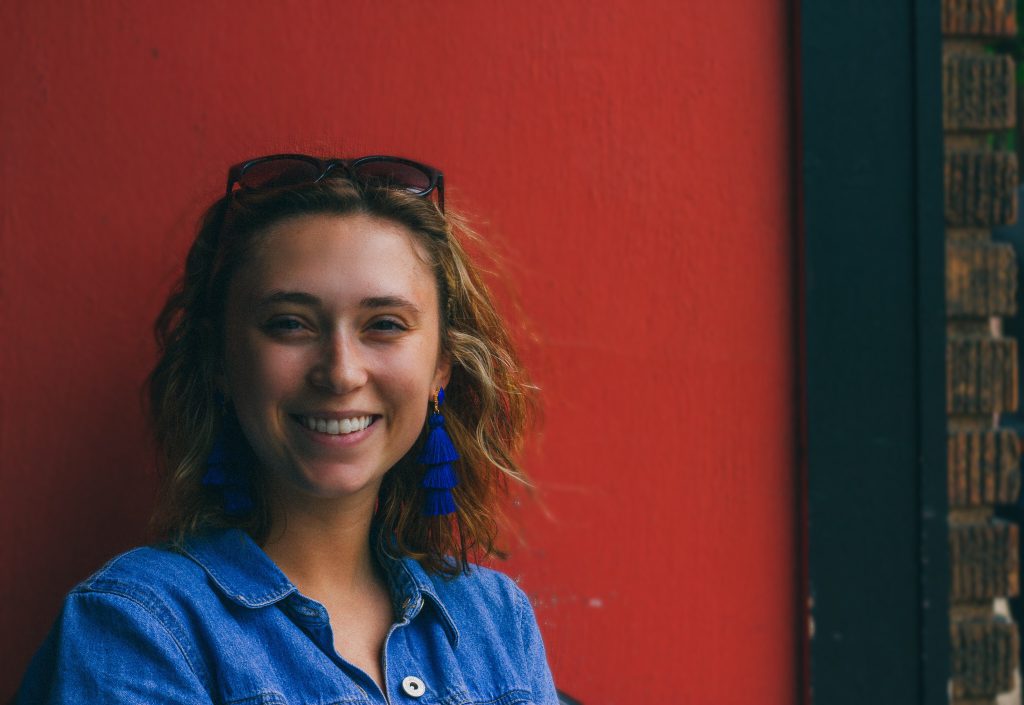
Shelby joined Sahiyo US as an intern with the Development Team in June 2021, and transitioned into the role of Development Coordinator in September 2021. She is currently a graduate student at Cleveland State University studying Applied Social Research. Shelby is passionate about female-founded organizations and is excited for the opportunity to contribute to Sahiyo’s mission. When and how did you first get involved with Sahiyo? I started with Sahiyo US in June 2021 as a development intern. In September 2021, I transitioned to the role of Development Coordinator. I’m thrilled to be working with the Sahiyo team! What does your work with Sahiyo involve? As the development coordinator, I research grants and funding opportunities to support our programs, activist retreats, and general operating expenses. I help with the writing process when submitting grant proposals and create monthly campaign emails to help ensure that Sahiyo has the monetary resources to carry out their mission. How has your involvement with Sahiyo impacted your life? Before working with Sahiyo, I was unaware of FGC and the impact on women and girls around the world. I have been involved with previous support groups for survivors of sexual violence on college campuses, and I have enjoyed working for an organization like Sahiyo that speaks out against violence. I love working with a team that has a passionate spirit and uplifts the voices of other women. Sahiyo has such a loving and supportive community that I feel truly honored to be a part of. What words of wisdom would you like to share with others who may be interested in supporting Sahiyo and the movement against FGC? The Sahiyo staff and volunteers are constantly challenging social norms, speaking out against FGC, and continuously proving themselves to be an organization that fulfills their goals. Sahiyo reminds me that there are people out there who care about ending violence against women (FGC specifically) and execute their goals in such a creative and powerful way.
Struggle, belonging, and community: Sahiyo and StoryCenter hosted a Voices to End FGM/C screening
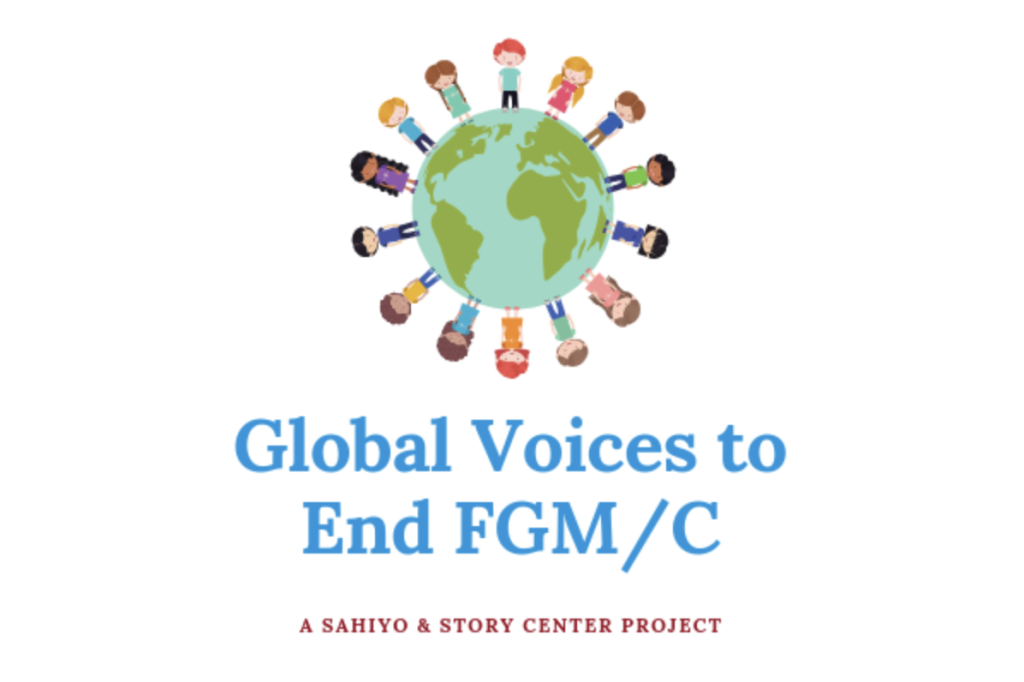
By Sandra Yu On August 19th, 2021, Sahiyo and StoryCenter co-hosted a film screening and panel discussion to highlight voices from the Voices to End FGM/C Digital Storytelling workshop. The event showcased eleven new digital stories, created virtually by a global group of advocates and survivors of female genital mutilation/cutting (FGM/C), during January and February. Lola’s transformation of shame to acceptance of her story is stunning to hear. Mariya Taher of Sahiyo and Amy Hill of StoryCenter, two facilitators of the annual workshop, led an audience Q&A and presented storytelling methodology, while two guest speakers, Nafisa (pseudonym) and Lola Ibrahim (Yoruba, English), shared their experiences with the digital storytelling workshop itself. Of the eleven stories shown, three were premiered at the event and had not been released to the public yet. The full collection can be found here, with stories continuing to be released. [blockquote font=”3″ italic=”yes”]”I feel liberated” Nafisa said. “I feel lighter, and I feel scared all at once. I wanted to talk about this work and khatna and the challenges that are faced in the community for many years.[/blockquote] The 2021 Voices digital collection succeeded tremendously in capturing the core concept of oppressive social norms. Almost reminiscent of short vignettes, each digital story actualized the abstract concept of social norms into concrete experiences. The stories stood individually as personal narratives of struggle, belonging, and community. Comparatively, this collection presented the larger struggles of individuals and collectives in battling gender-based violence. In response, audience members engaged deeply with each story, typing out messages with empathy and gratitude to each storyteller for taking up the challenge of telling their stories. It was uplifting to see how the digital stories could elicit such reactions of allyship and community-building, even within a Zoom chat. My personal highlight from the event was hearing Nafisa and Lola reflect on their experiences of storytelling and tackle the nuances of FGM/C in their respective communities. The digital storytelling workshop was evidently transformative, in similar and different ways for each participant. [blockquote font=”3″ italic=”yes”]“Sharing my shame can make a difference,” Lola said. “You understand that. Because you own that story. And you’re able to tell the story. So you’re no longer ashamed.”[/blockquote] Lola’s transformation of shame to acceptance of her story is stunning to hear. Through the workshop, she found a close-knit community to listen and empathize with her story. By producing a digital story, she now engages a global community to respond to her story. [blockquote font=”3″ italic=”yes”]“I felt powerless because in the world that we live in, when you’re anonymous, you feel like your voice is taken away,” said Nafisa. “You don’t have an identity, but I think sharing my story has allowed me to have a voice or has created a space for me. It has put the power back in my hands.”[/blockquote] Nafisa’s story is equally hopeful. Despite her anonymity, Nafisa proudly holds ownership of her story and continues to advocate against FGM/C. Sahiyo is excited to announce the upcoming 2022 Voices to End FGM/C digital storytelling workshop, as part of their continued partnership with StoryCenter. This workshop is open to all individuals who have a story to share about how they, or someone they know, have been impacted by FGC, and will be held virtually. For those interested in taking part, please fill out the application by Friday, December 11, 2021. Read more about the 2022 workshop and/or donate to support the Voices project.
Practitioner and advocate training: Best practices for working with survivors of gender-based violence
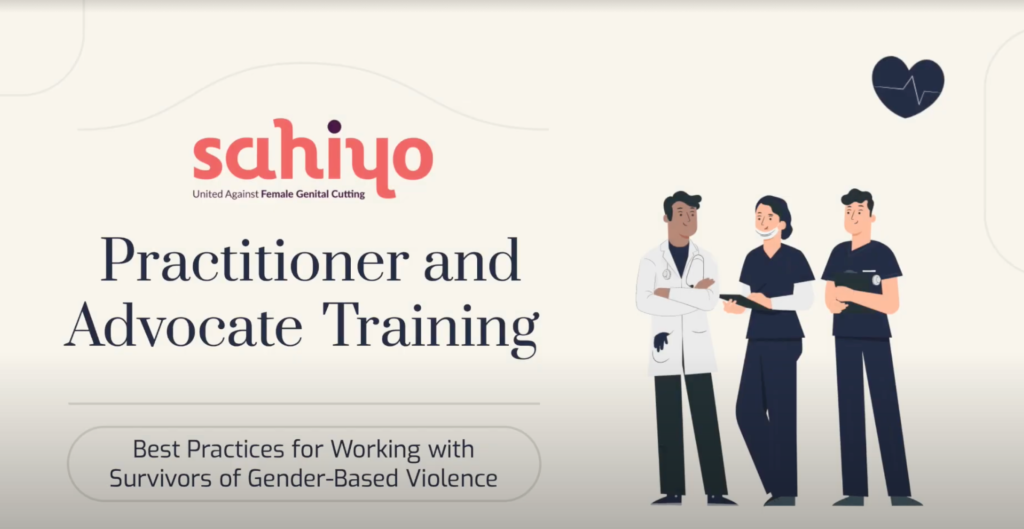
In June Sahiyo partnered with Hidden Scars to host training for practitioners and advocates working with survivors of gender-based violence (GBV) and female genital cutting (FGC). Gender-based violence (GBV) is a reality for many women and girls. The World Health Organization reports that one in three women will experience sexual or physical violence in her lifetime. Yet, GBV often remains hidden and shrouded in silence and shame. At the core of providing better prevention, protection, health, and social support services for women and girls are stronger data, enhanced research, and community engagement. Our presentation explored how practitioners can provide trauma-informed care to survivors of GBV, using FGC as a case study. We also provided resources for clinicians and other front-line professionals who may come in contact with women impacted by both, and who are looking to better understand how to provide better care. While Sahiyo’s expertise is in addressing FGC, we acknowledge that FGC is a form of gender-based violence and child abuse. Our team felt that many of the lessons that can be learned about how to help survivors of FGC could also be applied to all forms of GBV. Like other forms of gender-based violence, such as domestic violence, FGC is a learned behavior of childhood, and is often surrounded by a culture of silence and shame, and is a form of generational violence. However, GBV can also include childhood marriage, rape, sexual assault, honor crimes, domestic violence, and other crimes against women. While we used FGC as a case study, our goal was to create training that would allow practitioners to provide better care to all survivors of gender-based violence. [youtube url=”https://www.youtube.com/watch?v=nya-MMeAlJ4″] During this event, we provided an overview of FGM/C and GBV, as well as shared videos from our Voices to End FGM/C project. These videos helped our audience better understand the complicated emotions and experiences survivors go through, and to begin to think about how they as providers can better support them in their journey toward healing. We also shared tools such as the George Washington University FGM/C Toolkit, Mumkin, and other resources that are available to help them and their organizations think about how to provide better care to survivors. Finally, in order to facilitate conversations and help our guests practice communicating with survivors, we also hosted mock conversations. These conversations were held with the goal to help practitioners become more comfortable speaking with survivors and to practice having productive conversations with patients. We strongly encourage anyone who works in healthcare or provides direct services to survivors of GBV or FGC to watch the recording of this event on our YouTube page, or check out these additional resources below: Addressing FGC in the Clinic: A Dialogue Between Survivors and Health Care Professionals Diagnosis, Management, and Treatment of Female Genital Mutilation or Cutting in Girls Female Genital Mutilation/Cutting: An Under-recognized form of Gender-Based Violence in the U.S.
Sahiyo takes part in a variety of virtual NGO CSW 65 Forum events in March
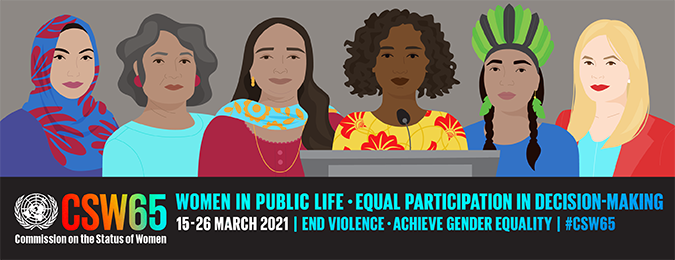
Due to the COVID-19 pandemic, the 65th Commission on the Status of Women (CSW) meetings took place virtually March 15-26, with thousands of individuals from civil society from across the globe taking part to collaborate and connect with each other on the pressing issues of our times and the progress we have made toward achieving gender equity and equality. Every year the NGO CSW/NY organizes the civil society side of the United Nations Commission on the Status of Women. The NGO CSW Forum runs parallel to the official session taking place at the U.N. Headquarters. This provides civil society the opportunity to engage in the processes and CSW sessions without ECOSOC-accreditation or a U.N. grounds pass. This year, Sahiyo co-hosted, organized, and was a speaker at the following parallel sessions: March 16th Using Storytelling to Shift Social Norms and Prevent FGM/C Sponsored by Sahiyo & StoryCenter Sahiyo and StoryCenter introduced their collaborative Voices to End FGM/C project, which centers on storytelling by survivors and those affected by female genital mutilation/cutting (FGM/C) as a tool to challenge social norms that perpetuate the practice. Using a combination of didactic presentation, audience participation, and short videos, the presentation explored the theoretical underpinnings of the Voices Project, highlighted the success of our digital storytelling workshops, and shared how the project has supported women in their healing journey and furthered efforts to prevent future generations of girls from enduring this form of gender-based violence. Read a recap of the event here. View the event here. [youtube url=”https://youtu.be/eqKWrODSODg”] March 19th The Power of Digital Media and Achieving Gender Equality Sponsored by Muslim American Leadership Alliance (MALA) Digital media has been a powerful resource toward achieving gender equality. It has been integral in raising awareness for issues pertaining to gender-based violence; equity and equality in social communities; and economic participation for women. It also has been a resource to provide financial literacy and economic opportunities for women on a global scale. This panel convened nonprofits, corporations, digital media experts, and activists to bring forth a comprehensive dialogue on how current and future digital/social media tools can further accelerate the realization of gender equality and the empowerment of all women and girls. CSW 65 theme is an assessment of current challenges that affect the implementation of the Platform for Action and the achievement of gender equality, and the empowerment of women, and its contribution towards the full realization of the 2030 Agenda for Sustainable Development. View the event here. Panelists: Mariya Taher | Co-founder, Sahiyo Sali Mahgoub | Deputy Director at Obama Foundation Holly Weckler | Developer Innovation Lead at Synctera March 23rd Amplifying The Voices On Ending Female Genital Mutilation Sponsored by Soroptimist International Co-sponsored by North American/European Caucus This event addressed violence against girls, focusing on female genital mutilation/cutting in North America, Europe and beyond which hinders women from achieving gender equality and empowerment. Various aspects of this issue were addressed by experts and survivors who work to achieve the Sustainable Development Goals (SDGs) and end all forms of violence against women. Furthermore, it addressed the lifetime trauma FGM/C has on victims’ wellbeing and the effect of COVID-19 on the lived experiences of the girls and women in relation to FGM/C. View the event here. March 24th Partnerships to Accelerate Global Action to End FGM/C by 2030 Sponsored by Global Platform for Action to End FGM/C When the Beijing Declaration and Platform for Action was adopted, estimates suggested that 133 million girls and women had experienced female genital mutilation/cutting in Africa alone. With improved data, estimates now suggest 200 million girls and women globally have been affected. If action to end FGM/C is not accelerated, an estimated 68 million girls will be cut by 2030. The COVID-19 has further impacted progress towards abandonment of FGM/C. Hearing first-hand from grassroots activists and survivors, this session explored models of success from specific communities across different continents that have led to sustained reductions in FGM/C prevalence and have the potential to accelerate progress through broader adoption. The Global Platform for Action to End FGM/C, an international group of organizations advocating to stop FGM/C, of which Sahiyo is a founding member. Read the reflection blog post here. View the event here.
Sahiyo staff join panel on FGM/C with Drexel University faculty and students
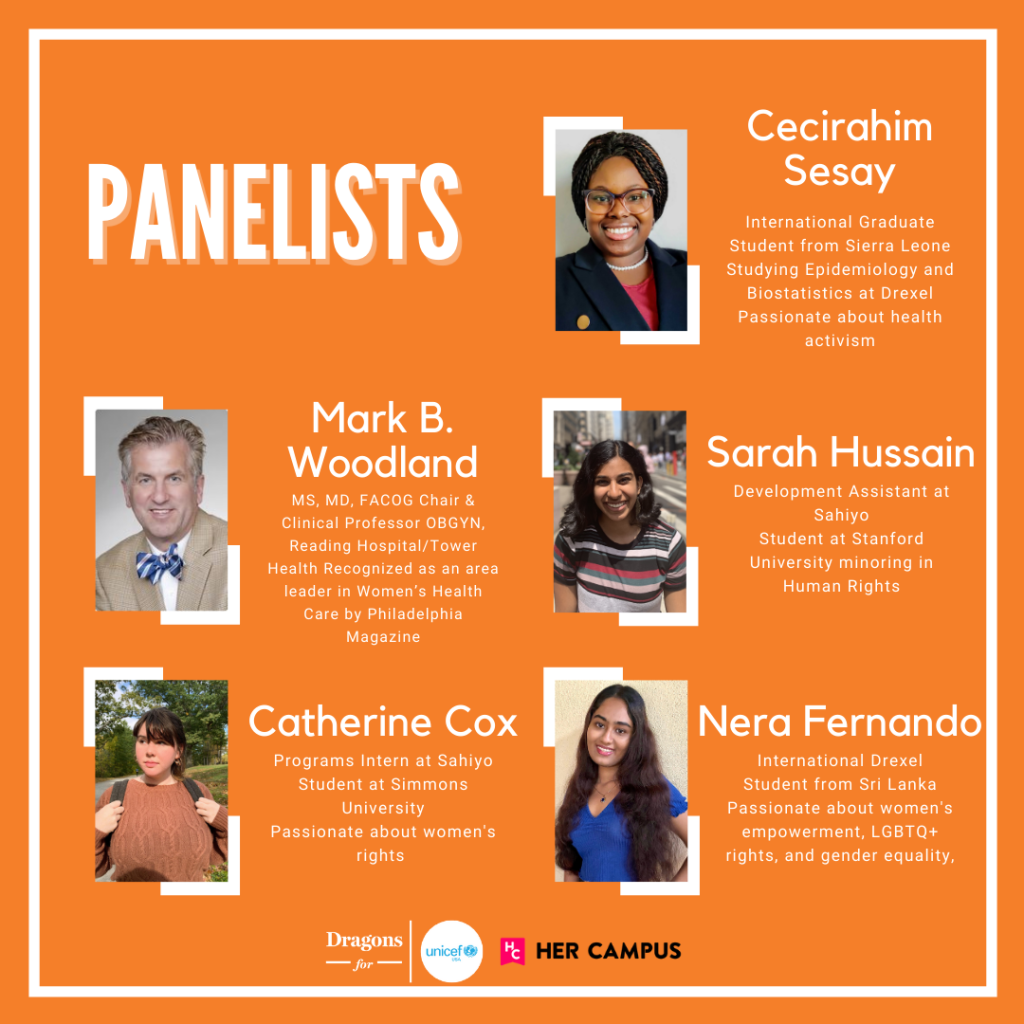
On March 29th, Sahiyo’s Development Assistant Sarrah Hussain and Programs Intern Catherine Cox were invited to speak at a panel discussion on female genital mutilation/ cutting (FGM/C). Hosted in partnership with the UNICEF Unite Club at Drexel University, this panel featured three other speakers: Mark Woodland, M.D., activist Cecirahim Sesay, and activist Nera Fernando. Dr. Woodland is a professor and chair of the Department of Obstetrics and Gynecology at Drexel University College of Medicine. He serves on several committees and advisory groups at the Institute for Women’s Health and Leadership. Fernando is a student at Drexel University from Sri Lanka who offered her insight from a social perspective, exploring the underlying causes of FGM/C, and what it is like living in a community where FGM/C is the norm. Finally, Sesay is also a student at Drexel University and a health-equity activist who offered her personal insight into the underlying causes of the FGM/C and community norms. Combined, this panel of amazing speakers explored the health consequences of FGM/C, living in practicing communities, and how people can become better activists and allies in empowering communities to end the practice. Dr. Woodland explained the medical effects of FGM/C and its global prevalence. Next, Sesay and Fernando used their personal stories to explore the social norms that underpin the practice. Finally, Hussain and Cox from Sahiyo explored Sahiyo’s work and activism in the past, giving the audience a framework for their own activism. They highlighted the concrete steps everyone can take in their day-to-day lives to become better advocates in ending FGM/C. Panelists took audience questions that ranged from the history of law in the United States around the issue, the role that culture plays, and how the people in the audience can take concrete steps toward activism. Overall, the panel was an eye-opening exploration of the many issues and concepts surrounding FGM/C and the movement to abandon the practice. If you are interested in having a member of Sahiyo speak at an event at your institution, please email our team: info@sahiyo.com. You can also fill out our request for an outreach presentation form at http://sahiyo.org/programs/community-outreach.html.
